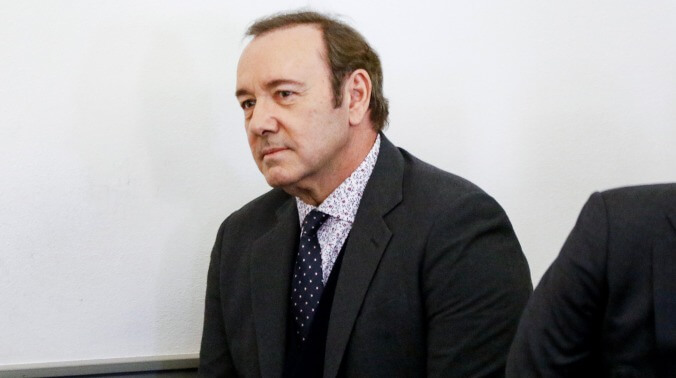Kevin Spacey Photo: Nicole Harnishfeger-Pool
A federal judge in New York has ruled that an assault and battery lawsuit against Kevin Spacey cannot proceed until one of the accusers—listed in the filings as “C.D.”—drops his anonymity. According to Variety, C.D. has 10 days from the date of the judge’s ruling to refile the $40 million lawsuit under his real name, or else the suit will be dropped. The suit was initially filed last September by C.D., who was joined in the legal action by actor Anthony Rapp—who came forward in 2017 with allegations of sexual abuse perpetrated by Spacey when Rapp was just 14 years 0ld. C.D. lodged similar allegations, accusing Spacey of multiple instances of sexual assault and battery when the plaintiff was also 14 years old.
Attorneys for C.D.—who is now in his 50s—argue that their client has experienced “extreme anxiety and psychological distress,” and that he suffers from PTSD (post-traumatic stress disorder), which would be re-triggered if his identity becomes public. Speaking to the court on behalf of C.D. in March, attorney Peter Saghir said his client “has reluctantly decided that in the event the Court denies his motion to proceed anonymously, he is emotionally unable to proceed with the action and will discontinue his claims.”
In a 20-page memo on the decision, Judge Lewis A. Kaplan was not entirely unsympathetic, acknowledging that the “digital age has adversely affected the privacy of litigants,” and the “lasting, damaging consequences” sexual assault can have on a victim’s mental health. But Kaplan goes on to note that, “Though C.D. is correct that the public generally has an interest in protecting those who make sexual assault allegations so that they are not deterred from vindicating their rights, it does not follow that the public has an interest in maintaining the anonymity of every person who alleges sexual assault or other misconduct of a highly personal nature.”
At the heart of Judge Kaplan’s decision is what he perceives as a contradiction between C.D.’s autonomously-defined sense of anonymity and anonymity in a larger sense—particularly in the context of the modern age. Kaplan writes:
“The evidence suggests that C.D. knowingly and repeatedly took the risk that any of these individuals at one point or another would reveal his true identity in a manner that would bring that identity to wide public attention, particularly given Spacey’s celebrity (…) As media coverage of the allegations against Spacey grows, as would be very likely as this litigation proceeds and a trial approaches or takes place, it is only common sense to say that the risk of disclosure would grow. He makes serious charges and, as a result, has put his credibility in issue.”
Kaplan points to a 2017 interview with Vulture, as well as C.D.’s numerous disclosures to various third parties about the allegations—and the fact that Spacey and his attorneys are already aware of C.D.’s identity—to suggest that the plaintiff has little anonymity to lose moving forward. Although C.D. and his attorneys have made it clear that he will drop the lawsuit to avoid going public, they could still change course over the next several days. Meanwhile, Spacey remains the subject of an open investigation in the UK, where he’s been accused of multiple instances of sexual assault.
















![HBO teases new Euphoria, Larry David, and much more in 2026 sizzle reel [Updated]](https://img.pastemagazine.com/wp-content/avuploads/2025/12/12100344/MixCollage-12-Dec-2025-09-56-AM-9137.jpg)
























